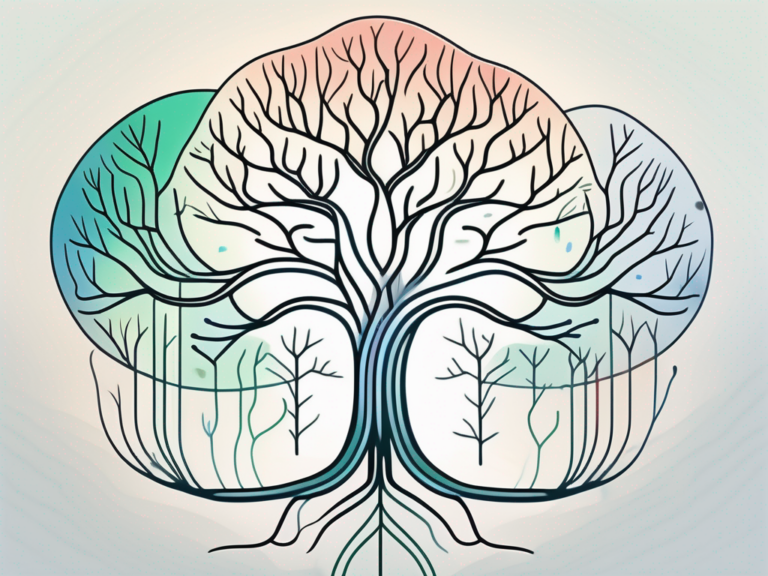Explaining Olfactory Nerve to kids
The olfactory nerve is an essential part of our sense of smell. It helps us recognize and interpret different scents in the world around us. In this article, we will take a closer look at the olfactory nerve and how it works.
Understanding the Basics of the Olfactory Nerve
What is the Olfactory Nerve?
The olfactory nerve is one of the twelve cranial nerves in our body. It is responsible for carrying information about smells from the nose to the brain. Just like a telephone wire carries signals, the olfactory nerve carries signals about what we smell.
The Role of the Olfactory Nerve in Smell
The olfactory nerve is like a messenger that delivers information to the brain. When we inhale through our nose, tiny odor molecules travel up the nose and bind to special receptor cells. These receptor cells send signals to the olfactory nerve, which then sends them to the brain for interpretation.
Imagine your nose is like a detective that can detect different smells and sends clues to the brain. Without the olfactory nerve, we wouldn’t be able to smell the delicious aroma of freshly baked cookies or the beautiful scent of a blooming flower.
Furthermore, the olfactory nerve is a unique cranial nerve because it is the only one that connects directly to the brain without passing through the thalamus, which is a crucial relay station for sensory information. This direct connection allows smells to evoke powerful memories and emotions almost instantaneously, bypassing the usual sensory processing pathways.
It’s fascinating to note that the olfactory nerve is also closely linked to our sense of taste. This is why when we have a stuffy nose, our sense of taste is often affected because the olfactory nerve cannot properly transmit smell information to the brain, leading to a diminished flavor perception.
The Science Behind How We Smell
The Journey of a Scent
When we breathe in through our nose, the air we inhale carries tiny particles called odor molecules. These molecules travel into our nasal cavity, where they come into contact with the olfactory epithelium. The olfactory epithelium contains millions of tiny nerve cells, which are the receptors for smell.
These nerve cells are like a key that fits into a lock. When an odor molecule matches the shape of a receptor, it binds to it, just like a key fits into a lock. This binding triggers a chemical reaction that sends an electrical signal to the olfactory nerve.
Interestingly, not all odor molecules are the same size or shape. Some are small and simple, while others are larger and more complex. This variety is what allows us to distinguish between different scents. For example, the molecules that create the smell of a rose are different from those that create the smell of a lemon.
How the Brain Interprets Smells
The olfactory nerve carries the electrical signals to a part of the brain called the olfactory bulb. This bulb is responsible for processing the signals and translating them into smells that we can recognize and understand. It’s like a translator that helps the brain understand the language of smell.
Once the brain receives the signals, it combines them with other sensory information to help us identify the smell. For example, if we smell fresh pizza, our brain might remember the taste of pizza and make us feel hungry!
Moreover, our sense of smell is closely linked to our memories and emotions. Certain smells can trigger vivid memories or strong emotions because the olfactory bulb is connected to the amygdala and hippocampus, which are brain regions associated with memory and emotion. This is why a particular scent can transport us back in time to a specific moment or evoke powerful feelings.
The Importance of the Olfactory Nerve
Smell and Memory
Did you know that our sense of smell is closely linked to our memory? The olfactory nerve plays a crucial role in this connection. Smells can evoke powerful emotions and memories. For example, the smell of cookies baking in the oven might remind us of a special family gathering.
Scientists believe that the olfactory nerve has a direct connection to the amygdala and the hippocampus, which are parts of the brain responsible for emotions and memory. This is why certain smells can transport us back in time and bring back vivid memories.
Moreover, studies have shown that individuals with a heightened sense of smell tend to have more detailed and emotionally rich memories associated with specific scents. This phenomenon highlights the intricate relationship between our olfactory nerve and memory formation.
Smell and Taste
The olfactory nerve also works closely with our sense of taste. When we take a bite of our favorite food, the aroma combines with the taste to create a unique flavor experience. This is why food might not taste the same when we have a stuffy nose!
Furthermore, the olfactory nerve is responsible for detecting thousands of different scents, which in turn influence our perception of taste. This intricate interplay between smell and taste is what allows us to savor complex flavors and enjoy a diverse range of culinary experiences.
So, the olfactory nerve not only helps us appreciate the delicious scents in our environment but also enhances our enjoyment of food. The intricate connection between our sense of smell, memory, and taste showcases the remarkable complexity of the olfactory nerve and its impact on our daily experiences.
Common Issues with the Olfactory Nerve
Loss of Smell
Sometimes, due to illness or injury, the olfactory nerve may not function properly, resulting in a loss of smell. This condition is known as anosmia. If you can’t smell things, it might be challenging to detect danger, enjoy food, or experience the world around you to the fullest.
If you or someone you know experiences a loss of smell, it is important to consult a healthcare professional for appropriate guidance and support.
Loss of smell, or anosmia, can have a significant impact on a person’s quality of life. Beyond the inability to enjoy the aroma of a freshly brewed cup of coffee or the scent of a loved one’s perfume, anosmia can also affect one’s ability to taste food properly. This is because our sense of taste is closely linked to our sense of smell, and without the olfactory input, flavors can become dull and unexciting.
Distorted Smells
In some cases, the olfactory nerve can become distorted, causing smells to be perceived differently or unpleasantly. This condition is called parosmia. Imagine smelling a rose, but instead of its beautiful fragrance, it smells like something completely different!
If you notice any changes in how you perceive smells, it is important to seek medical advice to understand the underlying cause and explore possible solutions.
Parosmia can be a disorienting and distressing experience for those who encounter it. Everyday scents that once brought comfort or joy may now evoke feelings of confusion or even revulsion. This distortion in the olfactory sense can be triggered by various factors, such as head trauma, viral infections, or even certain medications. Understanding the root cause of parosmia is crucial in determining the most effective treatment approach, which may involve therapies aimed at retraining the olfactory system or addressing any underlying medical conditions.
Protecting Your Olfactory Nerve
Healthy Habits for a Healthy Nose
Keeping our noses healthy can help protect the olfactory nerve. Here are some healthy habits:
- Keep your nose clean by blowing your nose gently when needed.
- Avoid putting foreign objects, like your fingers, into your nostrils.
- Avoid being around strong chemicals or irritants that can harm your nose.
- Practice good hygiene by washing your hands frequently to prevent illnesses that can affect your sense of smell.
Our sense of smell is a powerful tool that often goes underappreciated. The olfactory nerve, responsible for transmitting scent signals to the brain, is a delicate and intricate part of our nervous system. By adopting healthy habits and being mindful of our nasal health, we can ensure this vital sensory pathway remains in optimal condition.
Additionally, incorporating aromatic experiences into our daily lives can further enhance our olfactory senses. Engaging in activities such as aromatherapy, where essential oils are used to stimulate the olfactory system, can not only provide a pleasant sensory experience but also potentially offer therapeutic benefits for both the mind and body.
When to Seek Medical Help
If you or your child experience any problems with your sense of smell, it is essential to seek medical help. A healthcare professional can assess your condition and provide appropriate guidance and treatment.
Remember, the olfactory nerve is an incredible part of our bodies that helps us experience the world through scent. Understanding how it works and taking care of our noses can ensure we continue to enjoy the magical world of smells!






